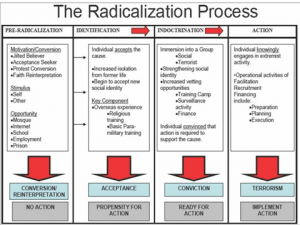Newspaper Article 06/06/2016

Radicalization is change in belief, feeling, or behaviour towards increased support for intergroup conflict. Terrorism is the worst outcome of radicalization.
People are not born radical; unjust practices, social/political alienation and personal experiences radicalize them. In the prevailing era, the phenomena of radicalization is widespread. The developing as well as the developed world are all encountering the radical forces. Some view abject poverty coupled with social/political isolation as prime causes of radicalization. While, there are instances where the educated and elite have also resorted to violence. In either of the case, the radical has faced some form of unjust behaviour, or discrimination which makes him susceptible to extreme views. The extremist well aware of the sensitivities of the deprived individual exploit his weakness. According to Marc Sageman Counter Terrorism Practitioner’s Radicalization Model, the radicalization process involves four stages – pre-radicalization, self-identification, indoctrination, and extremism. In the pre-radicalization stage, the individual lives an ordinary life and has not yet accepted the radical ideology. In the self-identification stage, the individual begins to explore the extremist ideology. In the indoctrination stage, adherence to the radical views is intensified, usually under the direction of an ideological leader. Finally, in the extremism stage, individual willingly accepts and carries out the assigned task. Thus, an extremist can be indoctrinated to become a terrorist. The pushing factors behind radicalization could be unjust practices, social isolation and economic deprivation. Class difference like backward versus modern and illiterate versus civilized and staunch religious versus open minded polarize the society. The conflict between the various social classes is detrimental to societal peace and contributes towards radicalism. Unemployment is also a major factor behind young people’s frustration, who are left with no other option but to revolt. In FATA, where radicalization is at its peak, no employment opportunities exist. Political/vested use of religion has prompted extremism. To completely eliminate radicalism, a holistic policy with focus on human security is required. This can be pursued through a de-radicalization and rehabilitation strategy. The two-pronged policy should focus on preventing naive individuals from getting radicalized and those who are radicalized to be rehabilitated. Education can play a significant role in this regard. The focus of education should be on nation state, citizenship, social and cultural harmony, individual and civic obligation and self-confidence. In addition, socio-economic equity is also an important factor in maintaining harmony at the societal level.
Radicalism is also promoted through regional conflicts. The prevalent environment is plagued with terrorism. While, on the other hand, the economic cooperation and regionalism has introduced a new trend in international politics. States through economic maneuvering try to reinforce their ingress, economic diplomacy and regionalism are the order of the day. In view of the prevailing trends, South Asia is the least integrated region of the world. The region accounts for only 3 percent of world GDP, and nearly 40 percent of its inhabitants live on less than US $ 1.25 per day. Besides, the region faces challenges of climate change, environmental degradation, and increased inequalities are threats to the region’s growth and prosperity. The India-Pakistan bilateral disputes, the Cold War politics, the Soviet invasion of Afghanistan and terrorism have impacted the politico-security architecture of South Asia. Seen the India-Pakistan bilateral disputes, the regional countries have failed to find amicable solutions. The antagonism and distrust continues to haunt the bilateral ties. As a result of the failed ventures, the extremist tendencies on both sides of the border have been reinforced. China’s interest in the development of Gwadar is to secure its economic interests. China’s enhanced regional role is an optimistic move, in the backdrop, of the economic incentives and regional integration. On the other hand, the regional players wary of China’s growth would try to limit China. This power game could prove to be detrimental for the regional peace. It may also reinforce the insinuations of mistrust among the regional countries.
To counter the radical forces, the SAARC states need to get united against terrorism, ensure security/stability of the region, and reap the benefits of energy connectivity/cooperation. China-Pakistan Economic Corridor (CPEC) will constitute energy transfer and is central to the region’s progress. Regional integration projects like Bangladesh-China-India-Myanmar (BCIM), Central Asia South Asia (CASA), Turkmenistan-Afghanistan-Pakistan-India (TAPI) should also be pursued.
Amna Ejaz Rafi
Assistant Research Officer (ARO),
Islamabad Policy Research Institute (IPRI)
Disclaimer: Views expressed are of the writer and are not necessary reflective of IPRI policy.

